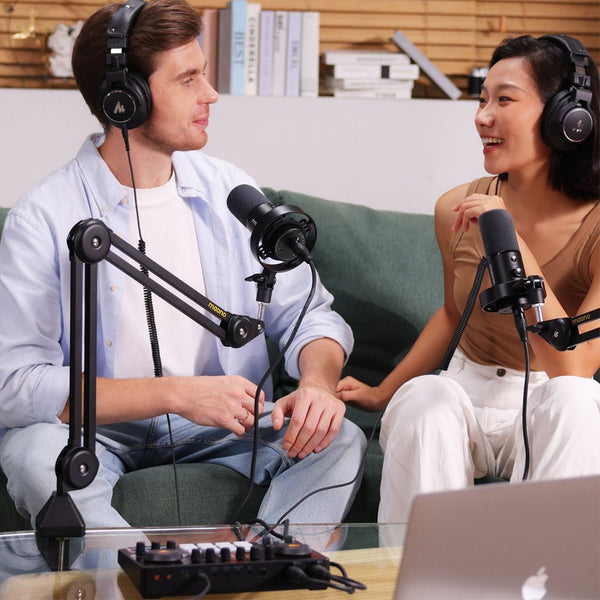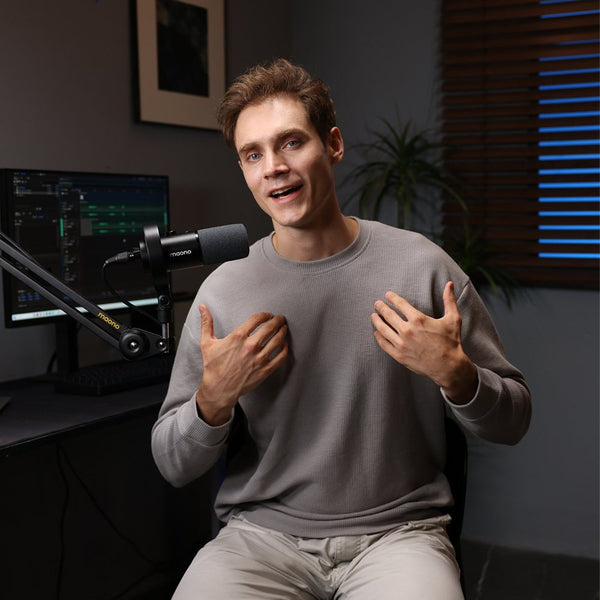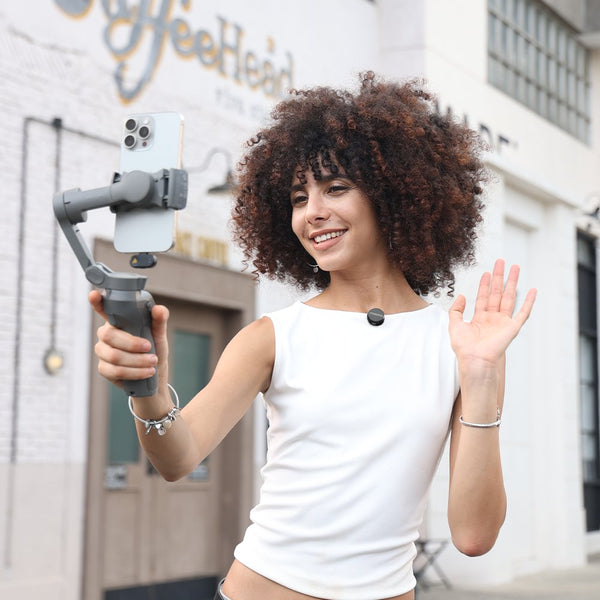How to Share Your Voice and Make a Difference with Quality Content
Are you a registered guidance counselor or a licensed psychologist? Maybe you want to offer your expertise in the field of psychology and make your services known by posting a Facebook ad or a video. Perhaps you want to promote your podcast channel and attract audiences from your social media platforms. No worries—vlogging about the services you offer can actually be beneficial for your business, and vice versa.
Mental health professionals today have powerful tools at their fingertips to extend their reach, share expertise, and connect with wider audiences. Among the most effective of these tools are vlogging and podcasting. Whether you're a licensed therapist, a school counselor, or a life coach, creating video or audio content can help demystify mental health topics, break down stigma, and offer guidance to people who may not otherwise have access to support.
Successful content creation isn’t just about what you say—it’s also about how you say it. Investing in a quality podcast microphone, for example, ensures your message comes through clearly, authentically, and professionally. This becomes especially important if you're sharing heartfelt stories, expert advice, or calming affirmations that people rely on in vulnerable moments.
In today’s digital age, content creation isn’t just for influencers and entertainers—it’s an essential strategy for professionals across many fields, including mental health. For psychologists, guidance counselors, and therapists, vlogging and podcasting offer an opportunity to educate, build trust, and reach new audiences. These formats help humanize your message, share mental health insights in an approachable way, and even grow your practice. With more people seeking mental health information online, professionals who create content position themselves as accessible, trustworthy experts.

What are the Best Practices for Successful Vlogging?
For mental health professionals stepping into the world of vlogging, it’s important to strike a balance between professional credibility and approachability. Here are a few best practices:
-
Know Your Audience
Tailor your tone and content to match the needs of your viewers. Are they teens struggling with anxiety? Parents looking for parenting advice? People seeking tools to manage stress?
-
Maintain Confidentiality
Never share client details, even anonymously, without consent. Instead, focus on general examples or hypothetical situations.
-
Be Consistent
Regular uploads (weekly or bi-weekly) help build a loyal audience. Consistency in posting and presentation builds trust.
-
Keep It Visual
Use clear visuals, including subtitles, callouts, and facial expressions to engage your audience, especially when discussing complex topics.
-
Add Value in Each Video
Whether you're explaining symptoms of burnout or sharing stress-reduction techniques, always give viewers actionable insights.
-
Stay Authentic
Mental health content is deeply personal. Speak from your experience and training, but show empathy, warmth, and genuine care.
How Can I Promote My Podcast to Reach People Who Need Mental Health Support?
Creating a great podcast is only half the journey—promotion ensures it reaches the people who need it most. Here are effective promotion strategies:
-
Use Social Media
Share short audio clips or quotes from your episodes on platforms like Instagram, TikTok, and LinkedIn.
-
Collaborate with Other Experts
Appear as a guest on other podcasts or vlogs within the health and wellness niche to expand your audience.
-
Optimize for SEO
Use searchable titles and descriptions with keywords like “mental health tips,” “stress relief,” or “relationship guidance.”
-
Email Newsletters
If you have a practice or website, include episode links in newsletters to current or prospective clients.
-
Join Podcast Directories
Submit your show to Spotify, Apple Podcasts, Google Podcasts, Stitcher, and other directories to boost visibility.
What Topics Are Best Suited for a Psychology or Guidance Counseling Podcast?
Mental health content thrives on clarity, compassion, and relevance. Here are some popular and impactful podcast topics:
-
Managing Anxiety and Stress
-
Healthy Coping Mechanisms for Teens and Adults
-
Understanding Trauma and Recovery
-
Workplace Mental Health and Burnout
-
How to Navigate Relationships and Communication
-
Parenting Advice Backed by Psychology
-
Exploring Emotional Intelligence
-
Mindfulness and Mental Health
These topics help normalize discussions around mental wellness and give listeners tools they can use in their daily lives.
What Platforms Are Best for Distributing a Psychology Podcast?
To maximize reach and accessibility, distribute your podcast on multiple platforms:
-
Spotify and Apple Podcasts: The largest platforms with a wide user base.
-
Google Podcasts: Great for Android users.
-
YouTube: Offers discoverability through video format and is excellent for vlogs.
-
Podbean, Buzzsprout, or Anchor: Hosting platforms that help distribute episodes and provide analytics.
-
Your Website: Embedding episodes on your own site allows you to maintain control and offer additional resources.
Make sure to also maintain a presence on social media to promote episodes and engage with your listeners.
How Long Should Episodes Be to Keep Listeners Engaged?
Length depends on your audience and format. For mental health podcasts, ideal durations tend to be:
-
10–15 minutes: Ideal for quick, focused tips or solo episodes.
-
20–30 minutes: Good for topic overviews or Q&A formats.
-
40–60 minutes: Best suited for interviews or deep dives into complex issues.
Shorter episodes are great for listeners on the go, while longer formats allow for nuanced discussion. Regardless of length, clarity and pacing are key—edit out filler to keep content engaging.
Can a Microphone Really Affect How Professional I Sound?
Absolutely. Your microphone is one of the most important tools in making a great first impression. Poor audio quality can distract listeners and make your message seem less credible. A clear, warm vocal tone not only enhances professionalism but also fosters trust and connection—especially important in mental health conversations.
A microphone affects:
-
Voice Clarity: Reduces muffling or distortion.
-
Ambient Noise: Filters out distracting background sounds.
-
Perceived Authority: A crisp, polished voiceover makes your message feel more intentional and trustworthy.
Whether you're using microphones for podcasting from a home office or a small clinic, quality matters. Investing in one of the best microphones for podcast production can significantly impact listener engagement and your perceived expertise.
How Do I Create a Podcast That Is Informative but Not Overly Clinical?
Here’s how to make your podcast both educational and accessible:
Use Everyday Language
Avoid jargon. Instead of saying “cognitive distortions,” say “unhelpful thinking patterns.”
Tell Stories
Share relatable examples or case studies (anonymized or hypothetical) that illustrate key points.
Speak Like a Mentor, Not a Lecturer
Sound like a caring guide rather than a professor. Your tone should be conversational, not academic.
Encourage Reflection
Ask questions your listeners can think about as they listen. This makes the content interactive and personal.
Inject Personality
A little humor or light storytelling can help make difficult topics feel safe and engaging.
Using warm, clear podcasting microphones helps ensure your tone comes through naturally and effectively.
Can Podcasting Help Grow My Counseling Practice?
Yes, podcasting is a powerful tool for professional growth and visibility. Here's how:
-
Establishes Credibility: Sharing insights consistently positions you as an expert in your field.
-
Builds Trust: Your voice and tone can help potential clients feel connected before they even schedule a session.
-
Drives Website Traffic: Link back to your practice website from podcast platforms or show notes.
-
Expands Your Reach: You’re not limited by geography—your voice can help people far beyond your local community.
-
Generates Leads: People may reach out after listening to multiple episodes and resonating with your message.
In short, podcasting can supplement your marketing efforts while genuinely helping people—a win-win for mission-driven professionals.
What’s the Best Mic for Recording a Voice Over in a Small Office or Home Setting?
If you're recording in a small office or home setup, choosing the right microphone is crucial. Two best podcasting microphones include:
-
Maono PD100 (Dynamic Microphone)
-
Best For: Professionals in less sound-treated environments
-
Features: Cardioid polar pattern for focused voice capture, low noise pickup
-
Pros: Great at rejecting background noise; excellent clarity
-
Connectivity: XLR (requires audio interface or mixer)
-
Maono PM422 (Condenser USB Microphone)
-
Best For: Plug-and-play convenience with high audio quality
-
Features: Touch mute, gain control, cardioid pattern
-
Pros: Ideal for solo podcasters and vloggers recording in quiet spaces
-
Connectivity: USB – no interface required
Both are exceptional microphones for podcast recording, offering clear audio and professional presence without breaking the bank. Whether you're a beginner or experienced podcaster, these mics help you sound your best in any setting.

Conclusion
Vlogging and podcasting aren’t just trendy marketing tools—they’re meaningful ways for mental health professionals to share knowledge, build trust, and support their communities. By following best practices, choosing the right equipment, and producing content with clarity and compassion, you can create an impactful presence online.
Whether you're aiming to educate, raise awareness, or expand your practice, your voice matters—and with the right tools and strategy, it can reach further than ever before. Start with one topic, one mic, and one message. Your expertise could be the lifeline someone didn’t know they needed.
Remember: clear content, authentic voice, and reliable microphones for podcasting can transform your digital presence and your professional reach.



